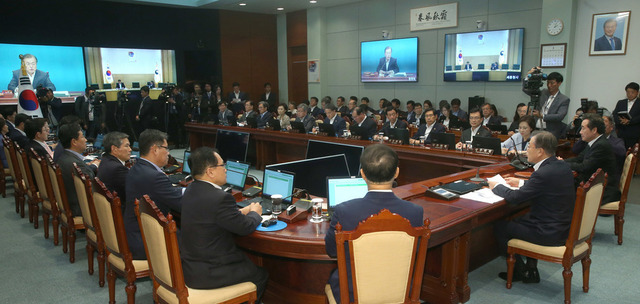Posted on : Aug.3,2019 13:09 KST
Modified on : Aug.5,2019 17:59 KST
 |
|
South Korean President Moon Jae-in presides over a Cabinet meeting regarding Japan removing South Korea from its white list of countries receiving preferential treatment in exports on Aug. 2. (Blue House photo pool)
|
Japanese Prime Minister Shinzo Abe finally made a decision that stands to leave South Korea-Japan relations in utter disrepair. In a Cabinet meeting on Aug. 2, Japan voted to remove South Korea from its “white list” of countries receiving expedited export processing for strategic goods. This could fairly be called an act of economic warfare on Tokyo’s part: controlling exports of items that could potentially deal a blow to South Korean businesses. The measures mean that Japan intends to compromise the very principles of free trade and treat its neighbor South Korea as a hostile power. The fissures this creates in the global system of cooperation and division of labor could have serious negative efforts not just on the South Korea and Japanese economies, but the global economy as well. We sternly denounce this myopic and self-destructive act by the Abe administration. Japan itself will have to face the consequences of the trade war Abe has ignited.
The important thing now is how we respond. President Moon Jae-in convened an emergency Cabinet meeting and decided that South Korea will also be removing Japan from its own white list. Criticizing the Japanese Cabinet’s approval of the measure as a “profoundly reckless decision that rejects diplomatic efforts and further exacerbates the situation,” Moon announced that Seoul would be “resolutely adopting measures corresponding to Japan’s unjust economic retaliation.” Declaring that South Korea “will not lose to Japan again,” he called on the public to “trust in the capabilities of the administration and businesses” and to “unite in confidence.”
Moon’s speech appears to have been well-timed: offering a point-by-point critique of the injustice of Japan’s decision and proclaiming a resolute response, while also sending a message in refined terms calling for the public to unite and for Japan to reflect. Not to echo the president, but the crucial thing at the present moment is indeed for us to unite and harness our capabilities. We cannot allow any more of the same reckless behavior shown by certain opposition parties and conservative media when they tried to pin the blame for the South Korea-US trade war on the Moon administration rather than on Abe back when Japan first made the decision to restrict semiconductor material exports in early July. Responsibility in this case – for violating the victims’ human rights, damaging the values of democracy, and laying waste to the principles of free trade – lies fully with the Japanese government. While some criticisms may be raised over the appropriateness of Seoul’s response, they should not be allowed to transform into support and defense for the hegemonic actions of Japan’s far-right administration. The time has come now for all sectors, including politicians, to focus their criticisms on Tokyo’s atrocious actions.
The president and administration need to play a central role in this uniting of public opinion. Certain groups will face the public’s judgment for their focus on criticizing South Korea rather than Japan. Hopefully, the president and administration will voice a message of unity and put it into practice, allowing us to marshal all of South Korea’s capacity in its battle against the Japanese government. We look forward to energies being harnessed by not just overcoming small political differences, but based on causes for the sake of South Korea-Japan relations and peace in Northeast Asia.
It’s also important for the relevant government ministries to carefully formulate and implement a response. The Abe administration’s white list decision spells unavoidable damage for South Korean industry. In addition to the three semiconductor material items that were already subject to export controls, individual reviews at the time of exportation will be required as of Aug. 28 for over 1,100 items spanning every industry except food and lumber. The administration and businesses will need to cooperate closely to keep the damage to a minimum, using every available means to ensure a stockpile of supplies and diversify importation sources. What we cannot allow in this process are attempts to drum up overblown fears by exaggerating risks that are unlikely to become reality. The key thing is for the South Korean economy to break free from its excessive dependence on Japan. Fostering South Korea’s material, component, and equipment industries – which are weaker than their Japanese counterparts – and building an ecosystem of mutual benefits for large and small businesses are tasks that can no longer be put off. If the administration and businesses can combine their capabilities, this situation can be turned into a blessing in disguise.
This situation originated out of a South Korean Supreme Court ruling ordering compensation for forced labor conscription, and the trade retaliation measures taken by the Abe administration in response. More fundamentally, however, it is a symbolic signal that the regime from the 1965 Claims Settlement Agreement – concluded between Japan and a Cold War-era South Korean military dictatorship – can no longer be sustained in its current antiquated form. That is why we do not have the option of simply papering over the conflict by agreeing to some sort of reconciliation in view of the potentially large economic blow. Even as it assumes responsibility for certain legacies of the “1965 system,” we hope the administration responds in a way that reflects changes in our historical values. It’s the only way to lay the foundation for a better future for both South Korea and Japan.
Please direct comments or questions to [english@hani.co.kr]






